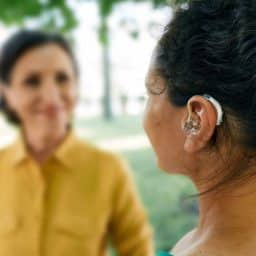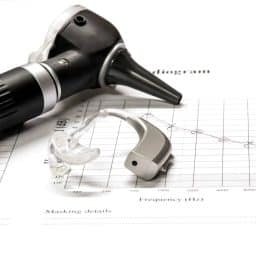How Your Hearing Loss Can Affect Your Immediate Family

Untreated hearing loss can lead to a lot of negative consequences. It can affect your performance at work, make it harder to carry on conversations with loved ones, and even worsen your mental and physical health. However, research shows that people with hearing loss aren’t the only ones negatively affected by their condition. Family members,…
How To Choose a Cell Phone When You Have Hearing Aids

Both cell phones and hearing aids have the overlapping goal of helping you stay connected to those you love. If you have hearing aids, you want to make sure your cell phone is compatible with your device so that you can experience the highest quality sound during your calls, no matter where you are. Are…
Ways to Support a Coworker with Hearing Loss

The National Institute on Deafness and Other Communication Disorders reports, “Approximately 15% of American adults (37.5 million) aged 18 and over report some trouble hearing.” Based on this statistic, chances are you have at least one coworker who experiences hearing loss. In this post, we review ways to support a coworker with hearing loss. Include…
How To Prevent Hearing Loss While Riding Motorcycles

When it comes to motorcycles, everyone knows how important it is to wear protective gear like helmets when riding down the Angeles Crest Highway. However, what’s not discussed as much is how important it is to protect your ears and take steps to prevent hearing loss while riding motorcycles. How Loud Noise Can Damage Your…
Don’t Overlook These Signs of Hearing Loss

Aging is one of the most common causes of hearing loss. Most cases of age-related hearing loss come on gradually, and many people can easily ignore some of the early signs. However, the earlier you can get tested and treated with hearing aids, the better it is for your hearing health. Here are five signs…
How Musicians Can Protect Their Hearing

The second most common cause of sensorineural hearing loss, after advanced age, is noise exposure. Those most at risk include those with noisy jobs or hobbies, such as musicians. Whether you play music in a garage, The Coach House in San Juan Capistrano, or in an arena, it’s important you take measures to protect yourself…
What Are the Differences Between Conductive & Sensorineural Hearing Loss?

There are three main types of hearing loss: conductive, sensorineural and mixed. The first two are classified based on where the problem is within the ear, while the last one is a combination of both. In this post, we focus on conductive and sensorineural hearing loss – primarily, the differences between them. Where They Occur…
These Hobbies Require Hearing Protection

While hobbies are a great way to stay active and engaged, some can reach dangerously high volumes that can damage your ears. Let’s look at a few popular hobbies that can cause hearing loss, as well as how to protect your ears. How Loud Is Too Loud When It Comes To Hearing Loss? While you…
The Link Between Hearing Loss & an Overwhelmed Brain
Do you have trouble following along and start to feel overwhelmed at family get-togethers and parties with friends? If so, you’re not alone. This is a common phenomenon for people with untreated hearing loss. A recent study found that the presence of background noise actually causes too many brain cells to fire. We review more…
What People With Hearing Loss Should Know About ADA Guidelines

Hearing loss can make it trickier to navigate the world around you. Treatment options like hearing aids and cochlear implants can make it significantly easier. However, you may still require additional accommodations to help you hear your best. This is where the Americans with Disabilities Act (ADA) can help. What is the ADA? The ADA,…